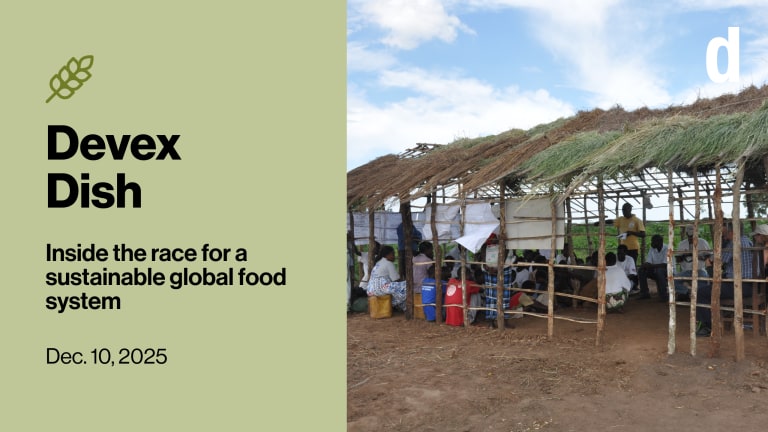What GiveDirectly's rise tells us about the future of cash transfers
Cash transfers programs are becoming more popular within the aid sector, but are they the best way to address extreme poverty?
After years of being seen as a fringe approach in the development aid sector, cash transfer programs are having a moment. Amid the sudden and widespread changes caused by the COVID-19 pandemic, such as lockdowns and increased unemployment, no-strings attached cash transfer programs went mainstream. Seemingly overnight, they became a popular aid tool for governments to quickly provide flexible funding to people who lost their income or incurred sudden expenses. Meanwhile, international agencies and NGOs like the United Nations and the International Rescue Committee have embraced giving cash. The UN Refugee Agency has said cash transfers “gives refugees the power of choice” on how best to use aid to meet their own needs. And the pandemic highlighted how cash transfers are a means of delivering funding quickly when access to other delivery systems is limited. GiveDirectly, a U.S.-based nonprofit that sends cash grants to people living in poverty, is the biggest philanthropic organization behind the popularity of cash transfers. Its many fans include some of the wealthiest people in the world, such as MacKenzie Scott and former Twitter CEO Jack Dorsey, who have both donated to GiveDirectly over the past two years. Donations to GiveDirectly spiked from $42 million in 2019 to $303 million in 2020. GiveDirectly recently named Rory Stewart, a cash transfer evangelist and former United Kingdom international development secretary, as its first president and CEO. His lofty goal? To prove cash transfers can be a transformative aid tool, with the power to end extreme poverty. “It may be time to realize that at least with cash, you can make a substantial difference in the lives of the very poor, even if you can't fix all the problems in the country.” --— Rory Stewart, president and CEO, GiveDirectly The rise in support for the cash approach marks a major shift from how the approach was initially received in the mid-1990s, when Mexican government economist Santiago Levy proposed giving people money to help them deal with Mexico’s economic crisis. At the time, cabinet ministers worried that parents might use the money to buy alcohol and cigarettes rather than milk and tortillas. Such criticisms still persist, though they’re not as widespread. Critics of cash transfers also say such programs aren’t as transformative as someone like Stewart says they are, and can’t effect the systemic changes necessary to meet the U.N. Sustainable Development Goal of ending poverty by 2030. GiveDirectly takes the lead GiveDirectly’s main program works by identifying the poorest people in low-income countries, then sending them one-time, no-strings-attached donations of around $1,000. Its growing prominence within the philanthropy and aid sectors is remarkable considering that when it launched in 2008, cash transfers to the poor were considered “experimental or even crazy,” GiveDirectly co-founder Michael Faye has said. Still, Faye told Devex, cash transfers’ evolution from outsider to the mainstream was gradual. He cited the United Nations’ endorsement of cash transfer programs as an especially pivotal moment. In 2016, then-U.N. Secretary-General Ban Ki-moon told world leaders that “where markets and operational contexts permit, cash-based programming should be the preferred and default method of support.” But it was the pandemic that pushed cash transfers to grow to “unprecedented levels of coverage” and reach 1.36 billion people, including roughly half of the population of East Asia and North America and about one-tenth of Africa’s, per World Bank data. Meanwhile, bilateral aid agencies and organizations are quickly adopting cash transfer programs, such as the U.S. Agency for International Development and UNICEF, said Amanda Glassman, an executive vice president at the Center for Global Development. USAID is one of GiveDirectly's major partners. “And one of the things that’s really remarkable about what’s happening in cash transfers is that, maybe because they’re perceived as controversial, is that they’ve been really well-evaluated,” she said. “We know so much about how they work.” More than 1.3 million research papers on cash transfers have been produced over the past three decades with 95,000 published in 2021 alone, according to World Bank research. Cash transfers have been proven to help people gain access to food, improve mental health, and reduce domestic violence, among other things, Glassman said. Boom or bust? The wave of support for cash transfers has been critical to GiveDirectly’s intense growth. What began as a small team run by Faye and collaborators Paul Niehaus, Jeremy Shapiro, and Rohit Wanchoo in 2011 is now a large operation of more than 900 employees, Faye said. Stewart, the organization’s new president and CEO, will lead the launch of projects in Malawi and Liberia as part of a scale-up driven by its mission to help eradicate extreme poverty worldwide by 2030. Faye, who had been acting as head of the organization, will serve as executive chair under Stewart. Stewart’s appointment potentially opens the doors to more partnerships between GiveDirectly and governments and international institutions. More than 180 governments implemented cash programs during the COVID-19 pandemic, according to World Bank data. One prominent critic is Heath Henderson, who warns that cash transfers might not be the best way to eradicate extreme poverty. Henderson is an economist and associate professor at Drake University who studies poverty and development. Direct cash can’t address the systemic issues that often trap people into poverty, such as limited educational opportunities and the lack of roads and other basic infrastructure, he said. Providing direct cash can also lead to disputes among community members over who receives assistance, thereby eroding “social capital,” Henderson wrote in an article last year. “I think a lot of people are supportive of cash transfers. Not a whole lot of people are all that critical, which is kind of surprising. I seem to be one of the few people that has been trying to be more critical of cash transfers,” said Henderson, who is writing a book critiquing the use of cash transfers, tentatively titled “The Poverty of Cash.” It’s fine to consider cash transfers as one tool in the aid toolbox, Henderson said, but there is a tendency in the sector to lift up certain solutions as a “silver bullet,” as happened with microfinance and property rights reform. In an interview with Devex, Stewart acknowledged that giving cash doesn’t deliver “big public goods,” but rather “smaller public goods” — and pointed out that “that the international development movement in 80 years has not managed to fix fundamental root causes and drivers.” “It may be time to realize that at least with cash, you can make a substantial difference in the lives of the very poor, even if you can't fix all the problems in the country,” he continued. Stewart said he does not want to turn GiveDirectly into a $200 billion nonprofit, but instead “encourage the rest of the industry to go into cash.” It also should be recognized that cash transfers are still just a small slice of the aid funding that goes out every year, Glassman said. Cash transfers reached only about 4.5% of the population in low-income countries, according to data from the Brookings Institution, a think tank based in Washington, D.C. “It’s not taking over, but it’s an interesting tool to use,” she said. “The key is to understand what problem you’re trying to solve and then test what works.” In the past, Faye has suggested direct cash to the poor should be the benchmark against which the aid sector should measure all other approaches. He has since softened his position and now says it makes more sense to consider cash the “default” method for providing aid, as Ban suggested. Cash transfers “shouldn’t be 100% of what we do, but it should be the starting place,” he said. If there is a more effective approach then that should be used, but “I hope we don't let the debate on which highly effective interventions is best distract from scaling these solutions to the tens of billions of dollars,” Faye added. William Worley contributed reporting. Update, Sept. 26, 2022: The story was updated to clarify that in addition to Paul Niehaus, GiveDirectly co-founder Michael Faye also collaborated with Jeremy Shapiro, and Rohit Wanchoo in 2011.
After years of being seen as a fringe approach in the development aid sector, cash transfer programs are having a moment. Amid the sudden and widespread changes caused by the COVID-19 pandemic, such as lockdowns and increased unemployment, no-strings attached cash transfer programs went mainstream. Seemingly overnight, they became a popular aid tool for governments to quickly provide flexible funding to people who lost their income or incurred sudden expenses.
Meanwhile, international agencies and NGOs like the United Nations and the International Rescue Committee have embraced giving cash. The UN Refugee Agency has said cash transfers “gives refugees the power of choice” on how best to use aid to meet their own needs. And the pandemic highlighted how cash transfers are a means of delivering funding quickly when access to other delivery systems is limited.
GiveDirectly, a U.S.-based nonprofit that sends cash grants to people living in poverty, is the biggest philanthropic organization behind the popularity of cash transfers. Its many fans include some of the wealthiest people in the world, such as MacKenzie Scott and former Twitter CEO Jack Dorsey, who have both donated to GiveDirectly over the past two years. Donations to GiveDirectly spiked from $42 million in 2019 to $303 million in 2020.
This story is forDevex Promembers
Unlock this story now with a 15-day free trial of Devex Pro.
With a Devex Pro subscription you'll get access to deeper analysis and exclusive insights from our reporters and analysts.
Start my free trialRequest a group subscription Printing articles to share with others is a breach of our terms and conditions and copyright policy. Please use the sharing options on the left side of the article. Devex Pro members may share up to 10 articles per month using the Pro share tool ( ).
Stephanie Beasley is a Senior Reporter at Devex, where she covers global philanthropy with a focus on regulations and policy. She is an alumna of the UC Berkeley Graduate School of Journalism and Oberlin College and has a background in Latin American studies. She previously covered transportation security at POLITICO.








